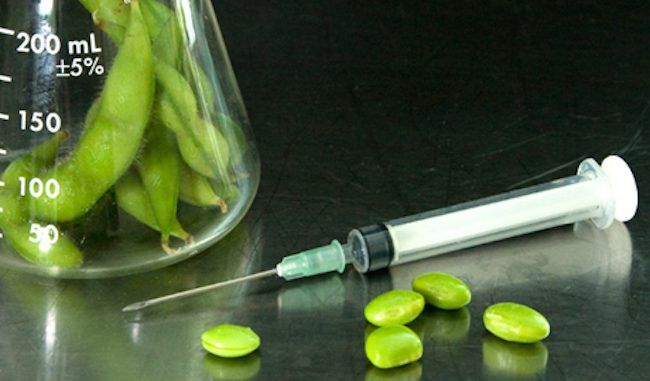
A new study has proven that animals who were fed on GMO soy that had been treated with Monsanto’s herbicide ‘Roundup’ had kids who’s growth was significantly stunted.
Pregnant goats who were fed with genetically engineered soybeans had offspring who were shorter and who grew more slowly according to a new Italian study (Tudisco et al., 2015).
Globalresearch.ca reports:

BYPASS THE CENSORS
Sign up to get unfiltered news delivered straight to your inbox.
You can unsubscribe any time. By subscribing you agree to our Terms of Use
Publishing in the journal of Small Ruminant Research, the researchers were testing the results of supplementing the feed of female goats with Roundup Ready GE soybeans.
Roundup Ready soybeans are engineered to resist the herbicide Roundup and are sold by agribusiness giant Monsanto. They are some of the most widely grown soybeans in the world.
The reduced growth of the goat kids was attributed by the researchers to their observation that the milk of the GE-fed mothers was significantly less nutritious and contained less of the IgG antibodies important for early growth.
“This was a carefully conducted study“, commented Dr Judy Carman, Director of the Institute of Health and Environmental Research, Australia. She was not involved in the research, but told Independent Science News:
“The differences in the composition of the colostrum between the mothers fed the GE soy and the non-GE soy were particularly striking. The colostrum from the GE-fed mothers contained only 2/3 of the fat, 1/3 of the protein and close to half of the IgG of the mothers fed the non-GM soy.”
GE-fed milk: less milk, fat, antibodies; presence of GE DNA fragments
To carry out these experiments the researchers divided pregnant female Cilentana goats into four groups, 60 days before kidding. Two of the groups were fed goat food containing GE Roundup Ready soybeans (at two different concentrations). The other two groups were fed conventional (non-GE) soybeans, also at two different concentrations.
After the mothers gave birth all offspring were fed only with their mother’s milk for 60 days. The growth of these kids was measured twice. After both 30 days and 60 days the kids of GE-fed mothers were approximately 20% lower in weight and shorter in stature. Both these differences were statistically significant.
Lower offspring weights were not the only unexpected findings. The researchers also found that the milk of GE-fed goats was lower in protein and fat. This difference in milk quality was large (6% protein in both GE-fed groups versus 18% in both non-GE fed groups) for the first few weeks after birth but gradually disappeared-even though the mothers continued to be fed the GE soybeans.
Additionally, the researchers also found that the colostrum produced by GE-fed mothers had low amounts of IgG antibodies. These antibodies are important for growth and for healthy immune development.
A third difference noted by the researchers was that transgenic DNA could be detected in the colostrum of most (10/16) of the GE-fed goats. No transgene DNA was detected in the milk of goats fed non-GE soybeans. This is not the first time that transgene DNA (or non-transgenic DNA) has been found in the milk of ruminants, however.

